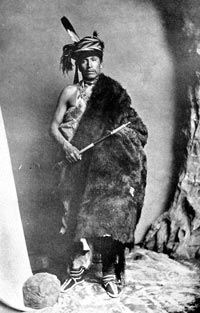| Why
pursue this marvelous undertaking? (And why is it really not marvelous at all?) |
|
|
eth·nog·ra·phy eth·nol·o·gy The
adopted voice of the project: Through the study of primitive cultures, the Western world can better understand our origins and appreciate our modern advancements. An entire catalogue of facts of human development from the lowest to the highest can be developed in the pursuit of complete scientific knowledge. Honorable
references
include: The
problems with this voice: Ethnologists took extensive measurements of skulls, bones, and various other body dimensions in an attempt to determine racial differences—differences which were generally taken as scientific proof of non-whites' inferiority to whites. Titles such as Wild Tribes of Borneo, The Uncivilized Races of Men, The Bakalai: Their Roving and Unsettled Habits, and The Balondo: Peculiar Gate; Maneko and Her Strange Costume reflect the scientists' voyeuristic attitudes and preconceived judgments about normalcy. "Peculiar," "strange," and "curious" were common terms used by a white voice of scientific authority to describe a colored, voiceless Other. Entire cultures were portrayed as though they were flocks of tropical birds with especially colorful plumage. Their status as voiceless oddities allowed their annihilation by Western expansion to be seen as simply a regretable byproduct of white destiny rather than a moral outrage against human beings. |
|

